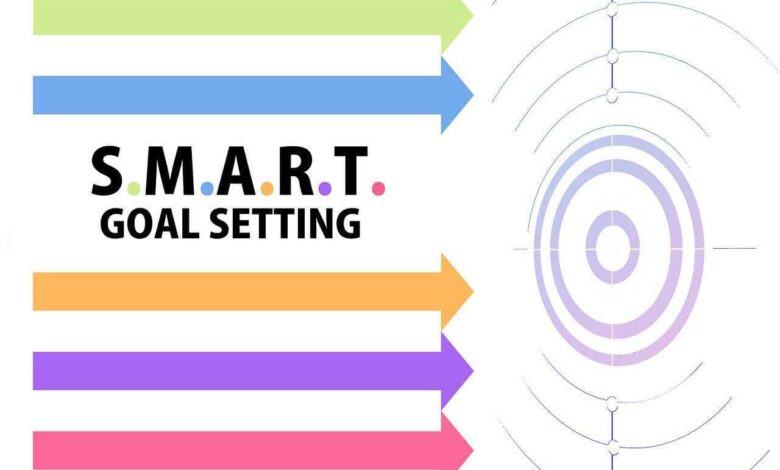Master SMART Goals: Achieve Your Dreams in 4 Steps

In today’s rapidly changing financial landscape, setting SMART financial goals has become more essential than ever. By adopting a systematic approach to goal-setting, individuals can navigate the complexities of personal finance with clarity and purpose. Let’s delve deeper into each aspect of setting SMART financial goals and explore actionable strategies for achieving them.
Table of Contents
Set SMART Financial Goals
Setting SMART goals is about transforming vague aspirations into concrete objectives. Each financial goal should be:
- Specific: Clearly define what you want to accomplish. For example, instead of saying “I want to save money,” specify “I want to save $5,000 for a down payment on a house.
- Measurable: Establish criteria to track your progress. This could include specific dollar amounts, percentages, or other quantifiable metrics.
- Achievable: Ensure that your goals are realistic and attainable within your current financial circumstances. Setting unattainable goals can lead to frustration and discouragement.
- Relevant: Align your financial goals with your broader life objectives and values. Consider how each goal contributes to your overall financial well-being and personal fulfillment.
- Time-bound: Set deadlines for achieving your goals to create a sense of urgency and accountability. This helps prevent procrastination and keeps you focused on taking action.
Achieve Financial Goals with 4 steps
While setting goals is a crucial first step, achieving them requires careful planning and execution. Here’s how to develop a comprehensive plan for reaching your financial objectives:
- Break Down Goals: Divide each major goal into smaller, more manageable tasks or milestones. This makes the goal less daunting and allows you to track progress more effectively.
- Create a Timeline: Assign deadlines to each milestone to create a sense of urgency and ensure consistent progress.
- Allocate Resources: Determine what resources—such as time, money, or expertise—you’ll need to achieve each goal. This may involve budgeting for expenses, acquiring new skills, or seeking professional advice.
- Identify Potential Obstacles: Anticipate challenges that may arise along the way and develop contingency plans for overcoming them. Flexibility is key to adapting to unexpected setbacks or changes in circumstances.
Break Down Financial Dreams into Milestones
Big financial dreams can feel overwhelming, but breaking them down into smaller milestones makes them more manageable. For example:
- Dream: Retire comfortably at age 65.
- Milestones: Save $100,000 by age 40, max out retirement account contributions annually, pay off mortgage by age 55, etc.
By achieving these milestones incrementally, you’ll steadily progress towards your ultimate financial objective.
Create a Realistic Financial Plan
A realistic financial plan takes into account your current financial situation, future aspirations, and risk tolerance. Here’s how to create one:
- Assess Your Finances: Review your income, expenses, assets, and liabilities to understand your financial position.
- Set Priorities: Identify your most pressing financial goals and allocate resources accordingly. This may involve saving for emergencies, paying off debt, or investing for retirement.
- Consider Risks: Evaluate potential risks—such as job loss, market downturns, or unexpected expenses—and develop strategies to mitigate them.
- Review Regularly: Periodically review and adjust your financial plan as your circumstances change. Flexibility and adaptability are essential for long-term success.
Track Progress Towards Financial Goals
Monitoring your progress towards your financial goals is crucial for staying on track and making necessary adjustments. Here’s how to effectively track your progress:
- Set Metrics: Establish key performance indicators (KPIs) for each goal to measure progress objectively. This could include savings balances, debt reduction milestones, investment returns, etc.
- Use Tools: Utilize financial tracking tools such as spreadsheets, budgeting apps, or online dashboards to monitor your finances regularly.
- Review Periodically: Schedule regular check-ins to review your progress and identify any areas where you may be falling short. Adjust your strategies as needed to stay on course.
Stay Motivated for Financial Success
Maintaining motivation is essential for staying committed to your financial goals, especially when faced with challenges or setbacks. Here are some strategies for staying motivated:
- Visualize Success: Imagine how achieving your financial goals will improve your life and keep that vision in mind as you work towards them.
- Celebrate Milestones: Acknowledge and celebrate your accomplishments along the way, no matter how small. This reinforces positive behavior and keeps you motivated to continue.
- Seek Support: Surround yourself with supportive friends, family members, or mentors who can encourage you and hold you accountable.
- Stay Flexible: Be open to adjusting your goals or strategies as needed. Life is unpredictable, and being adaptable is essential for long-term success.
Overcome Financial Goal Setting Challenges
Setting financial goals isn’t always easy, and you may encounter obstacles along the way. Here’s how to overcome common challenges:
- Fear of Failure: Recognize that setbacks are a natural part of the goal-setting process and an opportunity for growth. Embrace failure as a learning experience and use it to fuel your determination.
- Procrastination: Break tasks down into smaller, more manageable steps to reduce feelings of overwhelm and procrastination. Set deadlines and hold yourself accountable for meeting them.
- Lack of Resources: If you’re struggling to achieve your goals due to a lack of resources, such as time or money, get creative and look for alternative solutions. Focus on what you can control and take proactive steps to overcome obstacles.
- Self-Doubt: Practice self-compassion and remind yourself of past successes to boost your confidence. Surround yourself with supportive individuals who believe in your ability to succeed.
Prioritize Financial Goals Effectively
With numerous financial goals competing for your attention, it’s essential to prioritize them effectively. Here’s how to determine which goals to focus on:
- Assess Urgency: Identify which goals are most time-sensitive or have the greatest immediate impact on your financial well-being. These should take precedence over longer-term objectives.
- Consider Impact: Evaluate the potential benefits of achieving each goal and prioritize those with the highest impact on your overall financial health and quality of life.
- Balance Short-Term and Long-Term Goals: Strike a balance between short-term goals, such as paying off debt or saving for emergencies, and long-term goals, such as retirement planning or investing for the future.
- Revisit Regularly: Periodically review and adjust your priorities as your circumstances change or new opportunities arise. Flexibility is key to effective goal prioritization.
Align Financial Goals with Values
Aligning your financial goals with your core values increases motivation and enhances your sense of purpose. Here’s how to ensure your goals reflect your values:
- Identify Core Values: Reflect on what matters most to you in life, whether it’s family, career, personal growth, or philanthropy. Use these values as a guiding framework for setting financial goals.
- Evaluate Goals: Assess whether your current financial goals align with your core values and make adjustments as needed. For example, if giving back to your community is important to you, consider incorporating charitable giving into your financial plan.
- Stay Authentic: Be true to yourself and avoid pursuing goals that don’t resonate with your values or priorities. This ensures that your financial journey is personally meaningful and fulfilling.
Develop a Budget for Achieving Goals
A well-crafted budget is the foundation of successful goal achievement, providing a roadmap for managing income and expenses. Here’s how to develop a budget aligned with your financial goals:
- Track Expenses: Start by tracking your current spending habits to identify areas where you can cut back or reallocate funds towards your goals.
- Set Spending Limits: Establish spending limits for different categories such as housing, transportation, groceries, entertainment, etc., based on your financial priorities.
- Allocate Resources: Allocate a portion of your income towards each financial goal, ensuring that you’re making consistent progress towards achieving them.
- Monitor Progress: Regularly review your budget to ensure that you’re staying on track and making necessary adjustments as your circumstances change.
Invest Strategically for Financial Goals
Investing is a powerful tool for achieving long-term financial goals, providing the potential for growth and wealth accumulation. Here’s how to invest strategically:
- Diversify Your Portfolio: Spread your investments across different asset classes, such as stocks, bonds, real estate, and commodities, to reduce risk and maximize returns.
- Consider Your Time Horizon: Tailor your investment strategy to align with the time horizon of each financial goal. Short-term goals may be better suited to safer, more conservative investments, while long-term goals can afford to take on more risk.
- Regularly Rebalance: Periodically review and rebalance your investment portfolio to ensure that it remains aligned with your financial goals and risk tolerance. This involves selling assets that have performed well and reinvesting the proceeds into underperforming areas to maintain the desired asset allocation.
- Seek Professional Advice: Consider consulting with a financial advisor or investment professional to develop a personalized investment strategy tailored to your unique goals, risk tolerance, and time horizon.
Manage Debt to Reach Financial Goals
Debt can be a significant barrier to achieving financial goals, but with careful management, it can be overcome. Here’s how to manage debt effectively:
- Prioritize High-Interest Debt: Focus on paying off high-interest debt first, such as credit card balances or payday loans, as these typically carry the highest interest rates and can quickly spiral out of control.
- Consolidate Debt: Explore options for consolidating multiple debts into a single loan with a lower interest rate, such as a personal loan or balance transfer credit card. This can make repayment more manageable and potentially save you money on interest.
- Negotiate Lower Rates: Contact your creditors to negotiate lower interest rates or more favorable repayment terms. Many lenders are willing to work with borrowers who are proactive about addressing their debt.
- Avoid Taking on New Debt: While it’s important to focus on paying off existing debt, try to avoid taking on new debt whenever possible. Stick to your budget and live within your means to prevent further accumulation of debt.
Celebrate Financial Milestones and Wins
Celebrating financial milestones and victories along the way is essential for maintaining motivation and momentum. Here’s how to celebrate your progress:
- Acknowledge Achievements: Take time to recognize and acknowledge each milestone you reach, no matter how small. This could involve treating yourself to a special meal, enjoying a leisure activity, or simply reflecting on your accomplishments.
- Share Successes: Share your financial wins with friends, family, or peers who can celebrate with you and provide encouragement. Celebrating together reinforces positive behavior and strengthens social connections.
- Reflect on Progress: Use milestones as an opportunity to reflect on how far you’ve come and the progress you’ve made towards your larger financial goals. This can boost confidence and motivation for the journey ahead.
Adjust Financial Goals as Needed
Flexibility is key to successful goal achievement, as circumstances and priorities may change over time. Here’s how to adjust your financial goals as needed:
- Periodic Review: Regularly review your financial goals to ensure they remain relevant and aligned with your current circumstances and objectives.
- Assess Progress: Evaluate your progress towards each goal and identify any areas where adjustments may be necessary. This could involve revising timelines, reallocating resources, or setting new priorities.
- Be Realistic: Be realistic about what you can accomplish within your current financial constraints and lifestyle preferences. It’s okay to scale back or modify goals if they no longer serve your best interests.
- Stay Adaptable: Embrace change and be willing to adapt your goals and strategies as needed. Life is unpredictable, and being flexible allows you to navigate unexpected challenges and seize new opportunities.
Build Financial Confidence Through Goal Setting
Setting and achieving financial goals is a powerful way to build confidence and take control of your financial future. Here’s how goal setting can boost your financial confidence:
- Empowerment: Taking proactive steps towards achieving your financial goals empowers you to take control of your financial destiny and shape your future according to your own aspirations.
- Accomplishment: Each milestone you achieve reinforces your belief in your ability to overcome challenges and achieve success. Celebrating these victories builds confidence and motivates you to continue pursuing your goals.
- Resilience: The process of setting and achieving financial goals teaches resilience and perseverance in the face of adversity. By overcoming obstacles and setbacks, you develop the confidence to tackle future challenges with courage and determination.
By setting SMART financial goals, developing a strategic plan, and staying committed to your objectives, you can achieve financial success and build a brighter future for yourself and your loved ones.
Successful Women Examples
- Suze Orman (Personal Finance Expert): Suze Orman is a renowned personal finance expert who empowers women to take control of their financial futures through SMART goal setting and practical advice.
- Rachel Cruze (Mint.com): Rachel Cruze, the daughter of personal finance guru Dave Ramsey, motivates individuals to set and achieve attainable financial goals through her work with Mint.com.
- Tori Dunlap (Her First $100k): Tori Dunlap is the founder of Her First $100k, where she shares her journey of achieving financial independence and inspires others to set ambitious yet achievable goals.
- Bola Sokunbi (Clever Girl Finance): Bola Sokunbi is the founder of Clever Girl Finance, a platform dedicated to providing financial education and resources for women of color. She advocates for SMART goal setting to empower diverse communities.
- Jean Chatzky (Financial Journalist): Jean Chatzky is a financial journalist and best-selling author who offers practical guidance on setting and achieving financial goals through various life stages, helping women navigate their financial journeys with confidence.
- Erin Lowry (Broke Millennial): Erin Lowry, known as the Broke Millennial, helps young adults set realistic financial goals despite student loan debt, demonstrating that financial success is attainable regardless of one’s starting point.
- Manisha Thakor (MoneyZen): Manisha Thakor guides women to set SMART financial goals for retirement security and wealth building through her platform MoneyZen, empowering them to take charge of their financial futures.
- Paula Pant (Afford Anything): Paula Pant, the founder of Afford Anything, demonstrates achieving financial freedom through mindful planning and prioritizing goals, inspiring others to design lives they love.
- Catherine Zeta-Jones (Actress): Catherine Zeta-Jones is not only a successful actress but also a savvy investor who has diversified her income streams and transitioned careers, showcasing adaptability and goal-setting prowess.
- Emma Watson (Actress & Activist): Emma Watson, known for her roles in the Harry Potter series, invests in sustainable businesses and advocates for social causes, aligning her financial goals with her values and making a positive impact on the world.
Resources
Websites
- National Endowment for Financial Education (NEFE): NEFE offers comprehensive financial education resources, including articles, tools, and courses, to help individuals make informed financial decisions and achieve their goals.
- The Balance: The Balance provides expert advice and practical tips on personal finance topics, covering everything from budgeting and saving to investing and retirement planning.
- NerdWallet: NerdWallet offers personalized financial guidance and comparison tools to help consumers make smart money decisions, including credit cards, banking, insurance, and investing.
- Investopedia: Investopedia is a trusted source for financial education and investing information, offering tutorials, articles, and expert insights on a wide range of financial topics.
- Khan Academy Personal Finance Course: Khan Academy offers a free, comprehensive course on personal finance, covering key concepts such as budgeting, saving, investing, and retirement planning.
Books
- I Will Teach You to Be Rich” by Ramit Sethi: This bestselling book provides practical advice on automating your finances, optimizing your spending, and investing for the future, helping readers achieve financial success without sacrificing their quality of life.
- Broke Millennial Takes on Investing” by Erin Lowry: In this book, Erin Lowry demystifies the world of investing for millennials, offering clear explanations and actionable strategies for building wealth and achieving financial independence.
- Quit Like a Millionaire” by Kristy Shen and Bryce Leung: Kristy Shen and Bryce Leung share their journey to early retirement and financial freedom, offering insights into how they achieved wealth through smart investing, frugal living, and strategic decision-making.
Podcasts
- ChooseFI: ChooseFI is a podcast dedicated to financial independence and achieving the life you want, featuring interviews with experts and real-life success stories of individuals who have achieved financial freedom.
- Afford Anything with Paula Pant: Afford Anything is a podcast about financial independence, real estate investing, and designing a life of your dreams. Host Paula Pant explores topics such as passive income, entrepreneurship, and smart money management.
- Her First $100k with Tori Dunlap: Her First $100k is a podcast hosted by Tori Dunlap, where she shares her personal finance journey and interviews guests who have achieved financial success. The podcast covers topics such as investing, career advancement, and overcoming financial obstacles.
By leveraging these resources and adopting a proactive approach to financial goal setting, you can take control of your financial future and achieve the life of your dreams. Whether you’re saving for retirement, paying off debt, or investing for the future, setting SMART financial goals is the first step towards financial success and security.
SMART Goals
In conclusion, setting SMART financial goals is the cornerstone of achieving financial success and security. By defining specific, measurable, achievable, relevant, and time-bound objectives, individuals can create a roadmap to realize their financial dreams. With careful planning, diligent tracking, and the right resources, anyone can take control of their finances and build a brighter future. Remember, it’s never too late to start setting SMART financial goals and transforming your financial life.
FAQ: SMART Goals
1. What are SMART financial goals?
SMART financial goals are specific, measurable, achievable, relevant, and time-bound objectives that individuals set to improve their financial situation.
2. How do I prioritize my financial goals effectively?
Prioritize your financial goals by considering their importance, urgency, and impact on your overall financial well-being.
3. How can I stay motivated to achieve my financial goals?
Stay motivated by tracking your progress, celebrating small wins, and visualizing the benefits of achieving your financial goals.
4. What should I do if I encounter financial setbacks?
If you encounter financial setbacks, reassess your goals, adjust your plan as needed, and seek support from financial professionals or mentors.
5. How do I align my financial goals with my values?
Align your financial goals with your values by identifying what matters most to you and ensuring that your goals reflect those priorities.
6. Is it necessary to create a budget for achieving my financial goals?
Yes, creating a budget is essential for achieving your financial goals as it helps you track your income, expenses, and progress towards your objectives.
7. What are some common challenges in financial goal setting?
Common challenges in financial goal setting include procrastination, lack of clarity, fear of failure, and unexpected expenses.
8. How can I overcome limiting beliefs about money?
Overcome limiting beliefs about money by challenging negative thoughts, seeking education and support, and focusing on positive affirmations.
9. Should I seek professional financial advice for planning?
Seeking professional financial advice can provide valuable insights and guidance tailored to your unique financial situation and goals.
10. What resources can I use to improve my financial literacy?
You can improve your financial literacy by utilizing online courses, books, podcasts, and workshops offered by reputable financial education platforms.








